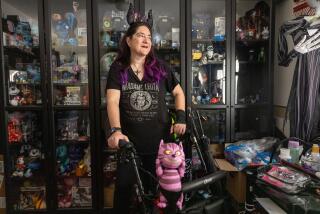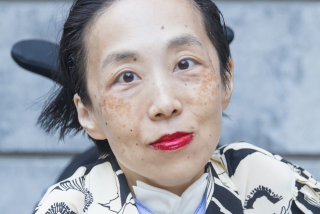Access Is the Law, Old Attitudes the Harsh Reality
- Share via
I am pretty hard to miss in my power wheelchair. I go places and do things like all busy preteens. But sometimes, I am learning, people treat me as if I were invisible.
Recently, we had field trips from school, and someone forgot to order a lift bus for my power wheelchair. Teachers and administrators say they want me to be independent, but they don’t always make sure that I can be. Without the lift for the big 5th-grade party at Calamigos Ranch in Malibu, I would have had to be pushed around all day by an adult while my friends ran off to play. I didn’t go on the field trip.
That same week, I attended the ‘N Sync concert at the Rose Bowl, with field seating. When I arrived on the field, I was asked how I got there and then was told that I “belonged” with “those people,” meaning the ones in the handicapped section. My mom transferred me to the seat and parked my chair in the “those-people” section.
Not long ago, at the mall an adult asked what was “wrong” with me. I really wanted to say, “People like you.”
As an 11-year-old who has always gone to regular schools with an assistant and who has friends of all abilities, I am learning that the world sees the chair instead of me.
I’ve often wished that while people are staring at my chair I could say, “Hello; I’m up here.”
I’m also struggling with how to respond without seeming angry or hurt because my mother cannot speak for me forever.
I think it is harder to be heard as a person with a different ability than a “non-disabled” person. We all have differences, and we all have a basic similarity. That is the desire to be loved and respected.
The Americans With Disabilities Act, or ADA, will celebrate its 10th anniversary on Wednesday. ADA and IDEA, the Individuals With Disabilities Education Act, were created in part because of problems like these. But nothing will change unless attitudes do.
My mom says that’s the hardest part. People need to become more educated about disabilities.
I have talked with teachers and administrators, with the ADA commissioner for the city of Pasadena and with the general manager of the Rose Bowl. All have apologized. My principal even said, “No kid will ever have to go through what you did.”
But unless people change their attitudes, some kid will. Laws alone won’t be enough.
It’s OK to befriend those of us who have disabilities. We’re not contagious or going to bite. Make eye contact and smile. Talk to us, not our parents. Even if unable to respond, everyone likes to be recognized. People with disabilities can be intelligent. Look at Stephen Hawking, the physicist.
Give us the chance to prove ourselves.
At some point, whether we like it or not, we will all become disabled if we don’t die instantly. Thank you for taking the time to read this. It’s a start toward changing attitudes.
Allison Cameron Gray, who has cerebral palsy, will enter 6th grade at Millikan Middle School in Sherman Oaks in the fall. She is a resident of Sherman Oaks.
’ As an 11-year-old who has always gone to regular schools with an assistant and who has friends of all abilities, I am learning that the world sees the chair instead of me.’
ALLISON CAMERON GRAY
Sherman Oaks


